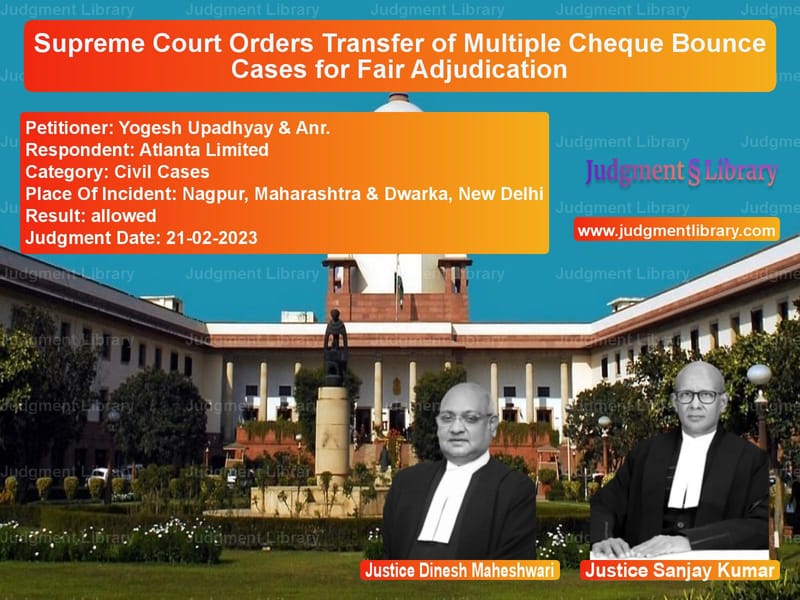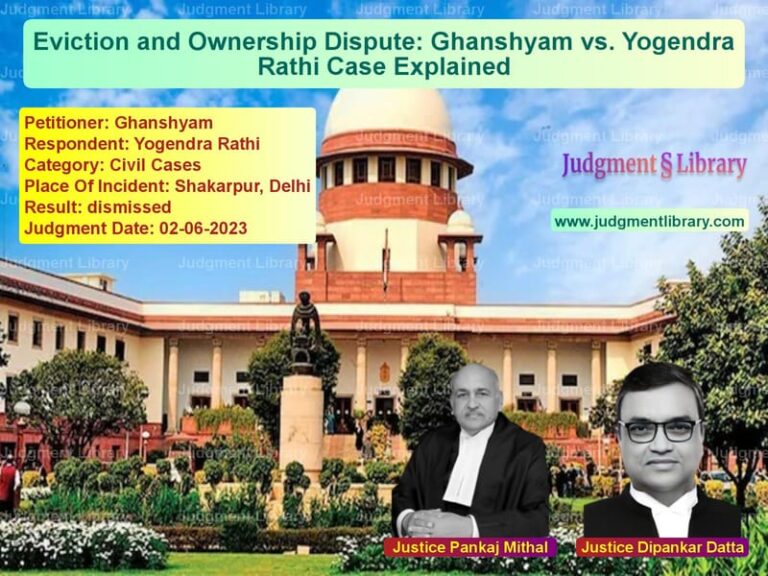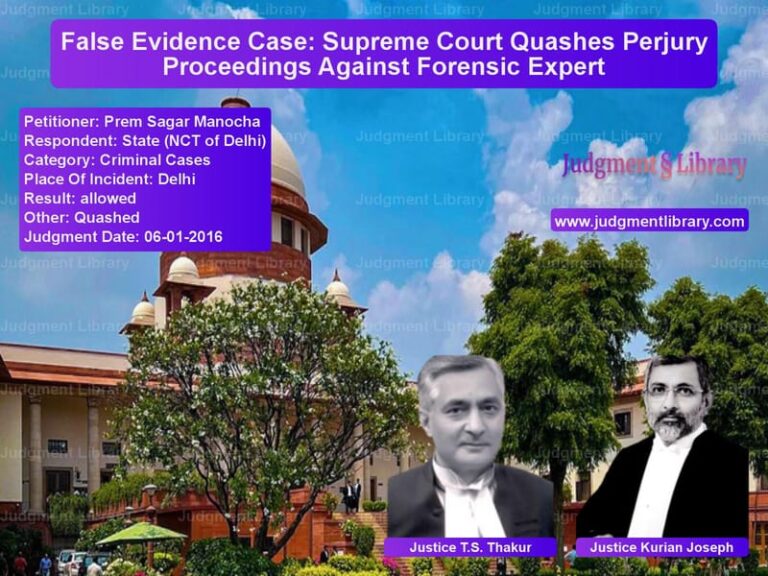Supreme Court Orders Transfer of Multiple Cheque Bounce Cases for Fair Adjudication
The Supreme Court of India, in the case of Yogesh Upadhyay & Anr. vs. Atlanta Limited, ruled on the transfer of multiple cheque dishonor cases under Section 138 of the Negotiable Instruments Act, 1881 (NI Act). The Court examined key jurisdictional issues and exercised its power under Section 406 of the Code of Criminal Procedure (CrPC) to consolidate the cases for a fair trial. The ruling clarifies the interplay between the NI Act’s territorial jurisdiction provisions and the Supreme Court’s authority to transfer cases.
Background of the Case
The dispute arose when Yogesh Upadhyay and his proprietorship firm, M/s. Shakti Buildcon, entered into a transaction with Atlanta Limited for the purchase of a crusher plant for ₹1,88,80,000. The agreement, signed on June 4, 2019, required payment in seven installments through post-dated cheques.
The first cheque was honored, but the remaining six cheques were dishonored due to stop payment instructions issued by the petitioners. As a result, Atlanta Limited initiated six separate cheque bounce complaints under Section 138 of the NI Act:
- Two cases were filed in Nagpur, Maharashtra, as the cheques were initially presented there.
- Four cases were filed in Dwarka, New Delhi, as subsequent cheques were presented there.
The petitioners sought to transfer the Nagpur cases to Dwarka to ensure a uniform trial.
Legal Issues Before the Supreme Court
The case raised several key legal questions:
- Does Section 142(2) of the NI Act override Section 406 CrPC in determining jurisdiction?
- Should all cases arising from the same transaction be consolidated to avoid conflicting rulings?
- Does the Supreme Court have the authority to transfer cases under Section 406 CrPC even when jurisdiction is defined under the NI Act?
Petitioner’s Arguments
The petitioners, represented by their counsel, contended:
“All six cheques were issued under the same transaction. To avoid multiple trials and contradictory rulings, the cases should be consolidated and heard together.”
They further argued that:
- Since the disputes arose from the same contract, it was in the interest of justice to have a single trial.
- Proceedings in two different states (Maharashtra and Delhi) would create unnecessary hardships and legal inconsistencies.
- The Supreme Court had the authority under Section 406 CrPC to ensure judicial efficiency by consolidating cases.
Respondent’s Arguments
The respondent, Atlanta Limited, opposed the transfer petition, arguing:
“Section 142(2) of the NI Act confers exclusive jurisdiction on courts where the cheques were presented for collection. The Nagpur cases cannot be transferred under Section 406 CrPC.”
Their additional arguments included:
- Section 142 of the NI Act contains a non obstante clause, which overrides other provisions, including Section 406 CrPC.
- Since the first two cheques were presented in Nagpur, Maharashtra, the courts there have exclusive jurisdiction over those cases.
- Allowing transfers based on convenience would set a precedent that undermines the specific jurisdictional provisions of the NI Act.
Supreme Court’s Observations
The Supreme Court analyzed past rulings and key legal provisions, concluding that Section 142(2) of the NI Act does not restrict its power under Section 406 CrPC. The Court cited significant precedents:
- In K. Bhaskaran vs. Sankaran Vaidhyan Balan (1999), the Court held that a cheque bounce offense consists of five components, any of which can confer jurisdiction.
- In Dashrath Rupsingh Rathod vs. State of Maharashtra (2014), the Court ruled that only the drawee bank’s location determines jurisdiction.
- Following the 2015 amendment to the NI Act, Section 142(2) clarified that jurisdiction lies where the payee’s bank is located, overriding the Dashrath Rupsingh Rathod ruling.
The Supreme Court held that Section 142(2) does not nullify its authority under Section 406 CrPC. Instead, if consolidating cases promotes judicial efficiency, the Court retains the power to transfer them.
Final Judgment
The Supreme Court delivered the following ruling:
- The two cases pending in Nagpur were transferred to Dwarka, New Delhi, where the other four cases were already pending.
- All six cases would be tried together to ensure consistent adjudication and prevent conflicting rulings.
- The non obstante clause in Section 142 of the NI Act does not override Section 406 CrPC. The Supreme Court retains the power to transfer cases when required for the ends of justice.
Implications of the Judgment
This ruling clarifies multiple legal principles:
- Consolidation of Related Cases: When multiple cases arise from the same transaction, courts should consolidate them to avoid contradictory decisions.
- Supreme Court’s Authority: Section 406 CrPC grants the Supreme Court power to transfer cases even when jurisdiction is defined under the NI Act.
- Clarification on Territorial Jurisdiction: While Section 142(2) establishes where cases should be filed, it does not prevent transfers when necessary.
Conclusion
The Supreme Court’s ruling in Yogesh Upadhyay & Anr. vs. Atlanta Limited reinforces the importance of judicial efficiency and consistency in legal proceedings. By transferring the Nagpur cases to Dwarka, the Court prevented legal contradictions and streamlined adjudication. This judgment serves as a critical precedent in cases involving multiple cheque dishonor complaints arising from a single transaction.
Petitioner Name: Yogesh Upadhyay & Anr..Respondent Name: Atlanta Limited.Judgment By: Justice Dinesh Maheshwari, Justice Sanjay Kumar.Place Of Incident: Nagpur, Maharashtra & Dwarka, New Delhi.Judgment Date: 21-02-2023.
Don’t miss out on the full details! Download the complete judgment in PDF format below and gain valuable insights instantly!
Download Judgment: yogesh-upadhyay-&-an-vs-atlanta-limited-supreme-court-of-india-judgment-dated-21-02-2023.pdf
Directly Download Judgment: Directly download this Judgment
See all petitions in Cheque Dishonour Cases
See all petitions in Contract Disputes
See all petitions in Consumer Rights
See all petitions in Judgment by Dinesh Maheshwari
See all petitions in Judgment by Sanjay Kumar
See all petitions in allowed
See all petitions in supreme court of India judgments February 2023
See all petitions in 2023 judgments
See all posts in Civil Cases Category
See all allowed petitions in Civil Cases Category
See all Dismissed petitions in Civil Cases Category
See all partially allowed petitions in Civil Cases Category







